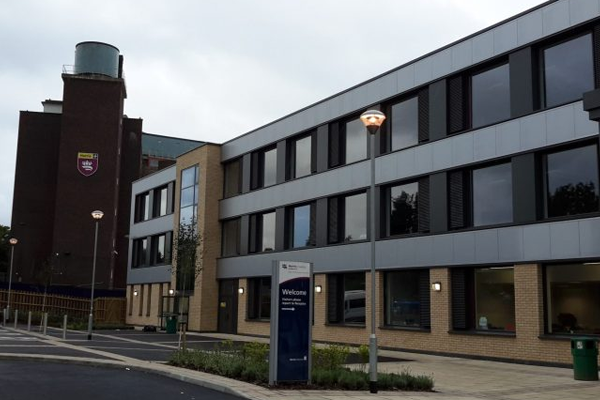CUSTOMER STORIES: One of the largest MATs in the UK invests in Stone devices following rapid growth

“We cannot recommend Stone any more highly. After deployment, all the machines just worked – in the industry that’s almost unheard of when you consider the sheer number of devices deployed. From the very start Stone understood our needs, suggested a service that would allow us to overcome our individual challenges, and has shown unrivaled flexibility and dedication no matter the requirements. In that sense, they have proved themselves to be a true partner.”
Lance Ball, Harris Federation
Background
Stone’s SCCM imaging solution ensured all 900 devices delivered across multiple academy sites were pre-imaged and ready for use, reducing deployment time by 520 hours.
Across the charitable trusts’ 44 Primary and Secondary academies in, and around London, those inspected have been judged to be Outstanding (71%) or Good. And that is success on a very large scale – Harris Federation’s 3,700 staff are responsible for educating 32,000 pupils or 1 in every 44 pupils in London, with a £200 million annual budget.
Key Information
- Installing 900 desktop and laptop devices
- Implemented a VPN connection
- Extended the existing Harris Microsoft SCCM solution to the Stone Manufacturing facility
- Saved over 520 hours manually deploying
- Migration of servers
Situation
Keeping up with the technology needs of a rapidly growing multi-academy trust
As Lord Adonis once said, “Harris academies…are a byword for quality and excellence”. With excellence comes the hope from the Department of Education that the trust will take on schools that would benefit from Harris’ track record of distinction.
For the IT department, this means a near-constant need to onboard schools, with all the resulting requirements to invest in technology for each new school, as well as refreshing existing technology.
Following an expansion of the academy group to include three new schools in time for the autumn term in September 2017, the Harris Federation put out a tender for 900 devices to be delivered across both the new and existing schools through the Crown Commercial Service.
As early adopters of the Shape the Future Breadth program changes last year, Harris were able to maximise their budget by taking advantage of the discounted Windows operating systems provided to qualifying customers.
Microsoft understands that their goal to empower every person on the planet everywhere starts in Education. By making devices more accessible and affordable to education markets, they are paving the way to ensure digital skills are a key part of every students’ education. By discounting their operating systems in this sector, they are ensuring that even due to tightened budgets IT is still accessible to schools.
Forward-thinking organisations such as Harris Federation are crucial to Microsoft achieving this goal. With added support from Microsoft partners such as Stone to make sure the process is seamless for customers and available to all. Organisations who adopt programs such as Shape the Future Breadth are making their spending more efficient and are able to achieve more for less.
But, procuring the devices is only half the story. For the relatively small IT team at the Harris Federation, they faced the monumental task of imaging nearly a thousand devices, often across multiple school sites, and occasionally within new buildings still under construction.
Solution
After a competitive tender process, Stone Group was selected as the preferred supplier for desktops and laptops via the Crown Commercial Services (RM 1054) Lot 1 Technology Hardware framework, providing 900 desktop and laptop devices to all of the Academies.
Prior to delivery, Stone implemented a VPN connection to extend the existing Microsoft System Centre Configuration Manager (SCCM) solution to the Stone Manufacturing facility at Stafford. Stone worked with the MAT to get approved images, with the correct drivers, tested and ready for use. Stone also ensured that the machines, once imaged, could be joined to the Harris domain.
Talking about the selection process Lance Ball said; “Of course the selection came down to the devices themselves, and Stone has a great reputation for building great education-centric devices, but what really proved to be essential for us were the added services Stone provides.
“As a relatively small IT team, with an already heavy project load over the summer, delivering such a huge number of devices across multiple academy locations and sometimes to school buildings yet to be completed, was going to be tough. And, honestly, we just didn’t have the capacity to deploy that many machines across so many locations.
“Stone came to us and offered to deliver all the correctly imaged and tested devices straight to site and ready for use. This included unboxing, full installation to desk and removal of the empty boxes and related packaging. In the end, picking Stone Group as our partner was a very easy decision.”
How does SCCM work?
Typically, when a new desktop or laptop is shipped to a customer, the customer will spend a significant amount of time setting it up, imaging the device, installing drivers and completing the User Acceptance Testing. And, that is a significant amount of technician time, even if you have only new 30 devices – not 900. Harris calculated that it would have taken 520 hours to manually deploy all the machines to desk, ready for use.
Using SCCM, Stone can dispatch the devices straight to site and it’s ready to go the moment it’s with the customer. Overcoming all of the issues of resourcing the deployment.
The process at Stone went through with Harris was as follows:
- Stone placed one of Harris’ servers in their data centre. It was securely connected via a site-to-site VPN creating a gateway to the customers’ own network
- Stone scanned the MAC address and serial numbers of the devices and sent that to Harris in electronic format for import into SCCM
- Harris added the list of devices to SCCM as an allowed client
- Stone collated the machines for each particular academy school
- Harris assigned a Task Sequence to install and configure everything that the particular user, whether staff or students, needs to be effective
- Systems are logged on using the supplied details and checked
- The devices were shipped to the schools and were ready to use on delivery
Talking about the SCCM process, Mark Whitfield, Head of Schools at Stone Group said: “We have seen massive growth in our SCCM services as the multi-academy trust movement has gained momentum. It just makes sense when you have huge volumes of devices to deploy, across multiple locations, to have your partner do the heavy hauling and manage the imaging of the machines for you.”
“Doing more with less is a challenge for everybody, but critically for education and local government. IT departments in public sector and education used to be bursting at the seams with highly skilled people available to help with a wide variety of jobs. Unfortunately, more often than not, that’s not the case any longer – IT teams are streamlined and up against it. Schools must find ways to make themselves more efficient, and doing this without affecting the delivery of first class education, isn’t always obvious. Refurbishment of devices will always need to happen, but savings can be made if you look for a partner that offers SCCM services to streamline deployment.”


